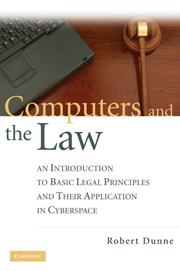Book contents
- Frontmatter
- Contents
- PREFACE
- ACKNOWLEDGMENTS
- 1 THE COMMON LAW AND STATUTORY LAW
- 2 CONTRACTS
- 3 TORTS INTRODUCTION
- 4 DEFAMATION
- 5 THIRD PARTY LIABILITY
- 6 COPYRIGHTS
- 7 TRADE SECRETS
- 8 TRADEMARKS
- 9 THE RIGHT OF PRIVACY
- 10 E-MAIL
- 11 THE RIGHT OF PUBLICITY
- 12 CONSTITUTIONAL LAW
- 13 PORNOGRAPHY AND OBSCENITY
- 14 ADVERTISING AND SPAM
- 15 JURISDICTION
- AFTERWORD
- INDEX
9 - THE RIGHT OF PRIVACY
Published online by Cambridge University Press: 05 June 2012
- Frontmatter
- Contents
- PREFACE
- ACKNOWLEDGMENTS
- 1 THE COMMON LAW AND STATUTORY LAW
- 2 CONTRACTS
- 3 TORTS INTRODUCTION
- 4 DEFAMATION
- 5 THIRD PARTY LIABILITY
- 6 COPYRIGHTS
- 7 TRADE SECRETS
- 8 TRADEMARKS
- 9 THE RIGHT OF PRIVACY
- 10 E-MAIL
- 11 THE RIGHT OF PUBLICITY
- 12 CONSTITUTIONAL LAW
- 13 PORNOGRAPHY AND OBSCENITY
- 14 ADVERTISING AND SPAM
- 15 JURISDICTION
- AFTERWORD
- INDEX
Summary
Introduction
What do we mean by a “right of privacy”? Justice Cooley in 1888 defined it simply as a right to be left alone. Alternatively, it may be defined as a right to be anonymous. The two definitions are quite different but both are important, and the right to be anonymous is a form of privacy that has particularly significant implications in cyberspace.
In legal terms, our right of privacy amounts to a right to be free from government intrusion into certain areas of our lives and a right to be free from intrusion by other individuals into our “private” lives. The former is protected largely through Constitutional interpretation and a number of statutes; the latter is protected largely through the common law under tort principles.
Before 1890 no English or American court had ever granted relief based on such a claim as “invasion of privacy.” However, in 1890 a Harvard Law Review article by Samuel Warren and Louis Brandeis examined a number of cases ostensibly decided on other grounds, and concluded that these decisions were actually based on a broader principle, a right of privacy. Warren and Brandeis claimed such a principle was in fact necessary to deal with what was seen as the growing problem of excesses of the press.
New York was the first state to confront this issue head on in the wake of the article. Several lower courts had held the existence of a right of privacy.
- Type
- Chapter
- Information
- Computers and the LawAn Introduction to Basic Legal Principles and Their Application in Cyberspace, pp. 194 - 237Publisher: Cambridge University PressPrint publication year: 2009
- 1
- Cited by



